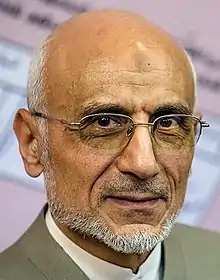Mostafa Mir-Salim
Sayyid Mostafa Agha Mirsalim (born 9 June 1947) is an Iranian engineer and conservative politician.
Mostafa Mir-Salim | |
|---|---|
 | |
| Member of the Parliament of Iran | |
| Assumed office 27 May 2020 | |
| Constituency | Tehran, Rey, Shemiranat, Eslamshahr and Pardis |
| Majority | 892,318 (48.45%) |
| Minister of Culture and Islamic Guidance | |
| In office 22 February 1994 – 19 August 1997 | |
| President | Akbar Hashemi Rafsanjani |
| Preceded by | Ali Larijani |
| Succeeded by | Ata'ollah Mohajerani |
| Advisor to the President of Iran for Research | |
| In office August 1989 – February 1994 | |
| President | Akbar Hashemi Rafsanjani |
| Succeeded by | Hassan Ghafourifard |
| Top Advisor to the President of Iran | |
| In office August 1982 – August 1989 | |
| President | Ali Khamenei |
| Preceded by | Office established |
| Succeeded by | Mir-Hossein Mousavi |
| Supervisor of Presidential administration | |
| In office August 1982 – August 1989 | |
| President | Ali Khamenei |
| Preceded by | Office established |
| Succeeded by | Hamid Mirzadeh[1] |
| Personal details | |
| Born | Seyed Mostafa Agha Mir-Salim[2] 9 June 1947 Tehran, Iran |
| Nationality | Iranian |
| Political party | Islamic Coalition Party |
| Other political affiliations | Islamic Republican Party (1980–87) |
| Children | 3, 2 daughters and 1 son[3] |
| Alma mater | University of Poitiers École nationale supérieure de mécanique et d'aérotechnique IFP School |
| Signature |  |
| Website | Official website |
| Military service | |
| Allegiance | Iran |
| Years of service | 1980–1981 |
| Commands | Shahrbani |
He was a presidential candidate at the 2017 election which placed third with receiving 1.16% of the votes.[4]
Early life and education
He obtained B.Sc. in Mechanics from Universite de Poitiers in 1969, M.Sc. in Mechanics from École nationale supérieure de mécanique et d'aérotechnique and M.Sc. Fluid Mechanics & Thermodynamics from Attestation d`Eludes Approfondies, Universite de Poitiers both in 1971 and M.Sc. in Internal Combustion Engines from École Nationale Supérieure du Pétrole et des Moteurs in 1972.[2]
He worked as an intern in Alsace Mechanical Industries until 1976, when he returned to Iran.[5] He worked at Tehran Metro as the operational director from 1976 to 1979.[5]
Career
Mir-Salim served as the national police chief following the Iranian Revolution.[6] He was proposed by then president Abulhassan Banisadr in July 1980 as a candidate for the prime minister as a compromise candidate acceptable to both Banisadr and the Majlis dominated by the Islamic Republican Party.[6][7] However, Banisadr was pressured to accept Mohammad-Ali Rajai instead.[7] From 1981 to 1989, Mir-Salim was the advisor to then president Ayatollah Khamenei.[8]
In the beginning of 1989, on the occasion of the death and funeral of Hirohito, the 124th Emperor of Japan who had ruled for over 60 years until he died on January 7, Mir-Salim and Hossein Saffar Harandi, a Member of Parliament and the Chairman of Parliament Committee on Agriculture, went to the Imperial Palace in Tokyo to attend the Rites of Imperial Funeral on February 24 with Mohammad Hossein Adeli, Ambassador Extraordinary Plenipotentiary in Japan, and his wife.[9]
Mir-Salim was appointed Minister of Culture and Islamic Guidance in 1994.[8] His tenure was characterized by a strongly conservative Islamist direction, aiming to stave off the "cultural onslaught" of Western culture and promote pious Islamic culture in its place, including through the use of repressive measures. The Ministry under his direction was particularly known for closing a number of reformist newspapers.[10]
He was later appointed to the Expediency Discernment Council.[11]
He is Assistant Professor of mechanical engineering at Amirkabir University of Technology, Tehran.[2]
Electoral history
| Year | Election | Votes | % | Rank | Notes |
|---|---|---|---|---|---|
| 2017 | President | 478,267 | 1.16% | 3rd | Lost[12] |
| 2020 | Parliament | 892,318 | 48.45% | 2nd | Won |
Personal life
According to Iranian Diplomacy, Mirsalim is married to a French woman.[5] He is fond of swimming and usually wears shenandoah beard, collarless tuxedos and dark calottes that serve as his signature look.[5]
References
- Hamid Mirzadeh
- "S. Mostafa Agha Mirsalim homepage". Amirkabir University of Technology. Archived from the original on 2014-01-01. Retrieved 2013-06-27.
- "مشخصات شناسنامهای 6کاندیدای ریاستجمهوری". 21 April 2017.
- Kumaraswamy, P. R.; Quamar, Md. Muddassir; Singh, Manjari (2019). Persian Gulf 2018: India's Relations with the Region. Singapore: Palgrave Macmillan. p. 60. ISBN 978-981-13-1977-8.
- "Mostafa Mirsalim: Back after Two Decades", Iranian Diplomacy, 18 December 2016, retrieved 1 May 2017
- "Iran's Police Chief Chosen as Premier in Compromise Move". The New York Times. 27 July 1980. p. 1.
- Mohsen M. Milani (1994). The Making of Iran's Islamic Revolution: From Monarchy to Islamic Republic. Westview Press. p. 176. ISBN 0-8133-8476-1.
- Feuilherade, Peter (1 April 1994). "Iran: media and the message". The Middle East. Retrieved 19 June 2013.
- Diplomatic Blue Book: the Year of 1989 - 5. Delegation Representatives of Countries and Organizations that Attended the Rites of Imperial Funeral of Emperor Shōwa (『外交青書 1989年版』 - 5.「昭和天皇大喪の礼」に参列した国及び国際機関の代表) (in Japanese), published by Ministry of Foreign Affairs of Japan
- Mehdi Moslem (2002). Factional Politics in Post-Khomeini Iran. Syracuse University Press. pp. 221–223. ISBN 0-8156-2978-8.
- "Appointment of New members of Expediency Discernment Council". 17 March 1997.
- "Final results of presidential election by province and county" (in Persian). Ministry of Interior. 8 June 2017. Archived from the original on 10 October 2017. Retrieved 8 June 2017.
| Wikimedia Commons has media related to Mostafa Mir-Salim. |